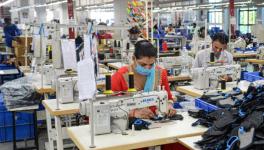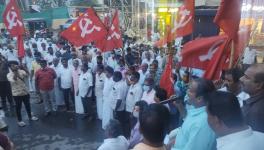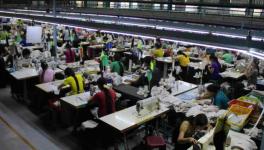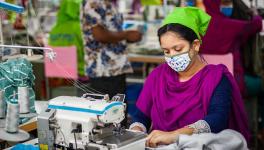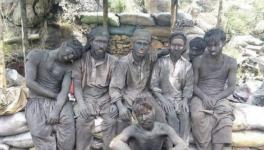Swaziland Union Vows to Fight Back After Taiwanese Garment Factory Files “False” Charges
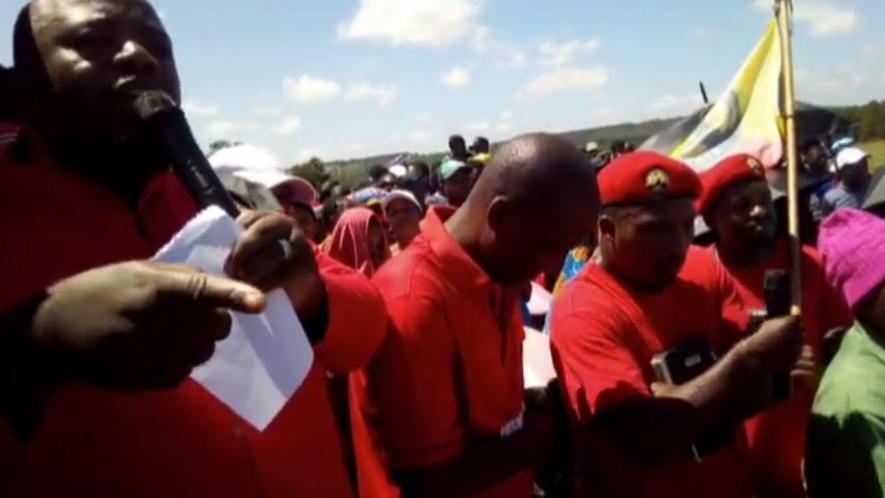
ATUSWA Secretary General Wander Mkhonza addressing workers of Zheng Yong and FTM Garments’ factories in Swaziland’s southern town of Nhlangano in March 2019.
Trade unionists in Swaziland and their allies across the world, including IndustriAll Global Union, have called out the union-busting practices of FTM Garments, a Taiwanese company operating from Swaziland. IndustriAll Global Union condemned the latest bid by the company to frustrate the organizing efforts of its affiliate, the Amalgamated Trade Unions of Swaziland (ATUSWA), through the filing of an allegedly false case against the union.
The case blames the union for loss of production and damage to property due to an alleged picket two years ago. It was filed by the company in August, only days after ATUSW filed a case against the refusal of FTM Garments to recognize the union. The refusal came despite a Conciliation Mediation and Arbitration Commission’s (CMAC’s) ruling in January 2020. The campaign against the union also acquires significance in the context of the close ties that are reported to exist between the company and the Swazi monarchy.
ATUSWA, which is nationally affiliated to Trade Union Congress of Swaziland (TUCOSWA), maintains that the alleged picket, which the company blames for the two-year old production losses, was never held.
Speaking to Peoples Dispatch, the union’s secretary general Wander Mkhonza recollected the events on August 30, 2018, when riots broke out in the town of Nhlangano, capital of Shiselweni district in the country’s southern region.
ATUSWA at the time was involved in a dispute with other companies, including Zheng Yong, a Taiwan-based garments company whose factory premises is located adjacent to that of FTM Garments.
Zheng Yong had failed to respond to the union’s demand that the minimum wage — which at the time was between E 1,300 (USD 80.72) to E 1,500 (USD 93.14) — be raised to the living wage of E 3,500 (USD 217.32). The struggle for a living wage continues in Swaziland, as the current minimum wage in the sector E 1,800 (USD 111.77) remains below the living wage.
On August 30, 2018, the CMAC, having been unable to bring the parties to an agreement, had issued a certificate of unresolved dispute. “We then called a meeting and..our members were in favor of strike action. A decision was taken to serve CMAC and the employer with strike notice in advance,” Mkhonza said.
After concluding the meeting, the members broke into a song and started marching back to Zheng Yong to report to work that day. Mkhonza explains that it is a tradition among the workers to disperse after union meetings while singing, which would continue as they enter the factory gates, until the bell rings to begin work.
On reaching the factory, however, the workers found that they had been locked out by Zheng Yong, whose guards had shut the gate. “Apparently, the management was afraid that the workers were going to riot. There was no reason for such an assumption,” he said, reiterating that there was no labor action planned for that day.
“I personally went and spoke to the guards. They informed me that the management had instructed them to keep the gates shut. While I was explaining to them that the workers had come to report to work and not to riot, a policeman approached me asking what the situation was about. After I explained, he asked the guards to let the workers in. The guards refused on the grounds that they had strict instruction from the management,” he added.
Then, in accordance with the advice of the police, Mkhonza, along with two other workers, were let in through the gates to the HR office, where a meeting was to be held between the union, management and the police.
“Just when the meeting was about to start, we heard shots outside the gate where the workers, still singing, were waiting. Police had fired tear gas and rubber bullets. Chaos then broke out as workers ran in all directions,” Mkhonza recollected.
This was about the time when workers of FTM, whose factory is separated from that of Zheng Yong only by a fence, were reporting to work. But the police were indiscriminate in their attacks, and FTM’s workers, who were not a part of this dispute, also had to run for cover.
“It is possible that while barging into their factory for safety, they may have damaged some doors etc,” he speculates. “FTM also alleges that there was looting, although I cannot confirm whether this actually happened.”
What he does confirm is that riots did break out but after the police unrelentingly pursued the workers, emptying out all the factories in the area, trying to drive the workers out of the entire industrial cluster. Miscreants, who were not garment industry workers at all, joined in the action and indulged in looting of garments and damaging machinery in some factories.
“The situation was not under our control at this point,” Mkhonza said, adding, it is important to note that at the time of this incident, neither was FTM Garments party to the dispute that CMAC had mediated unsuccessfully, nor did ATUSWA have any membership in FTM.
FTM Garments’ history of union-busting
It was only later in the year that the union started to organize the workers in this company. FTM responded by taking ATUSWA to the industrial court in February 2019, seeking a prohibition against the union’s activity, on the grounds that they were disrupting production.
Mkhonza claims that the unionists at the time had neither entered the factory premises nor had sought to engage the workers while they were at their workstation. “Our unionists used to go there early in the morning and meet the workers on the streets while they were on their way to the factory between 6:30 to 7. Once the work hours began, the organizers used to leave, and come back only during the lunch hour,” he said.
“But the judge still prohibited us from organizing without the company’s permission. Why should we ask their permission when we were not even on their premises? We were in fact not even on the pavements adjoining the factory,” Mkhonza said, adding “we obviously continued organizing in other ways. Once we had a sufficient number of members (over 50% of the employees), we submitted a formal application seeking recognition.”
The company refused. The union then raised a dispute, which CMAC finally arbitrated in January 2020, and resolved in favor of the union. Bound by the arbitration result, the FTM Garments then asked ATUSWA to submit the membership forms so that the company could deduct the union dues from its members’ salaries and transfer it, as required by Swaziland’s labor laws, directly to the union.
Upon submission of forms, however, the company, after dragging its feet for another month, told the union that it would not recognize it because it believed some of the forms were fraudulent.
“We reminded them that according to the labor laws of the land, even if there was a dispute over the authenticity of some forms, the company, having accepted the arbitration award, was obliged to make deductions for union dues from wages of other workers whose membership forms were not disputed,” Mkonza said.
“If these (undisputed) forms amount to membership of less than 50% of the workers, then they must give the union 3 months notice. If we fail to reach the 50% mark within this period, only then they must approach the industrial court with an application to derecognize the union,” he added.
After months went by without a resolution, the union, on August 13, approached the industrial court, seeking an order to enforce the company’s recognition of ATUSWA, in accordance with CMAC’s arbitration award. While this case remains ongoing, the FTM garments filed a separate case against the union on August 21, alleging that two years ago they had incurred property damage and loss of production due to a picket which, the union claims, was never held.
“We will fight on!”
Mkhonza says this is a part of the series of moves made by the company to prevent the union from organizing its workers. He says that they are doing it out of the knowledge that the case will drag on and impose a financial cost on the parties in terms of legal fees. This means little to the company but is dear to the union operating on the limited resources it has been able to garner from the membership fee paid by workers.
He adds that beyond the financial question, the battleground in Swaziland is titled in favor of companies. This is because the government, led by Africa’s last absolute monarch, King Mswati III, has time and again taken the side of Taiwanese companies against its own workers.
These companies, he claims, make huge donations to the various lavish ceremonies hosted by the royal family, while depriving its own workers a living wage. Every year, FTM Garments spends on the gifts for young women brought to participate in Umhlanga ceremony, by the end of which the King chooses a new wife from among them.
Even when the companies are, for name-sake, privately owned, they work in very close coordination with the Taiwanese government, which is undertaking many infrastructure projects in Swaziland for the King.
The Swazi monarchy, which remains the last African government to recognize Taiwan, in turn reciprocates by deploying its police and judiciary to subdue the cheap Swazi labor these companies exploit, to manufacture garments exclusively for exports – mainly to the US and South African market.
Despite overwhelming odds, the struggle would continue, Mkhonza said. “We will fight on! The company wants to distract us from our main task, which is to organize workers, by embroiling us in false cases. But we will not cave in. We have a small group of people dedicated to fight this case in court, while the majority of our unionists will continue with our task of organizing,” he declared.
Courtesy: Peoples Dispatch
Get the latest reports & analysis with people's perspective on Protests, movements & deep analytical videos, discussions of the current affairs in your Telegram app. Subscribe to NewsClick's Telegram channel & get Real-Time updates on stories, as they get published on our website.










